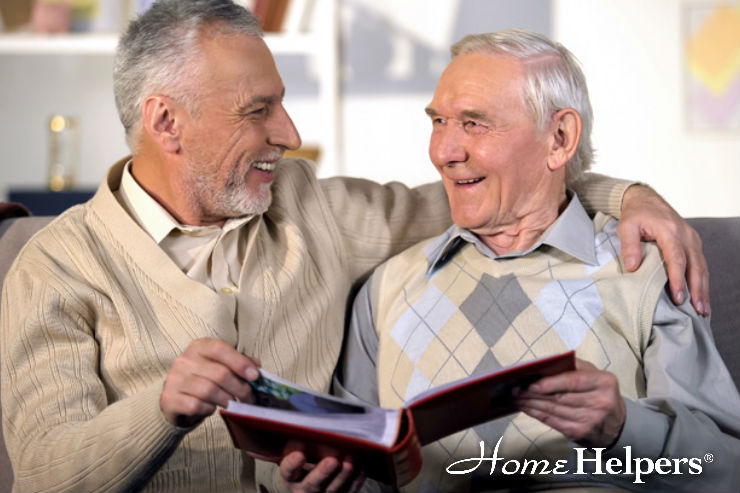Everyone loves to share memories, but there’s something extra special about sharing and talking about memories made many years back. For seniors who suffer from dementia or Alzheimer’s Disease, memories are especially special because the disease robs them of the ability to hold onto short-term memories, so long-term memories become all they have.
Therapy that involves sharing long-term memories is a very popular and effective treatment for those with Alzheimer’s. It helps them focus on the positive things that have happened in their lives, helps them feel connected, and generally boosts their sense of joy, belonging, and pride. For dementia’s earlier stages, it can also be helpful because the dementia patient often knows they are dealing with the cognitive decline and are looking for anything to hold onto.
There are some key differences between reminiscing and remembering. Asking someone if they can recall a place or a certain person can bring up negative feelings if they aren’t able to do this. So, rather than asking them to remember things, a person with dementia does better to ask them to reminisce about things. This allows them to steer the dialogue with what they do have memories of. The conversation becomes much more meaningful, this way.
One way to see this in action is to get an old family photo album or scrapbook and sit with a senior loved one. While going through it with them, pay attention to the pictures that spark a conversation that is based on their memories of the photo. If they are distressed with an unpleasant memory, you can be supportive and offer a listening ear, all while gently redirecting them to a more pleasant photo or memory.
You can also try these 3 reminiscing techniques with your senior loved one who struggles with dementia or early stages of Alzheimer’s:
Listen to Music. Dementia patients are extremely connected to music. This is because the part of the brain that controls musical memories stays very active even when the other cognitive parts of the brain have failed them. You can help them enjoy this activity by finding music they remember well, sing along with them, talk about memories attached to the song, etc.
Tastes and Scents. Our sense of smell and taste are also very connected to memories. You could get several scent jars and place scented things inside that the senior will be sure to remember. This could be pinecones, pine needles, certain foods, and things from the environment where he/she grew up.
Touch. Touch always stimulates us to think about certain memories. Just think about how many things you touch that instantly bring you back to childhood or a certain love interest. For seniors, this is no different. You can create tactile experiences such as old clothing, gardening, hobbies they once enjoyed like crocheting or knitting, or even working with tools or wood. Choosing items that you know will trigger memories from their past is important with this exercise and can be extremely therapeutic. They may feel garden soil in their hands and then begin telling you about the garden they tended as a child, etc. This gets them talking and reminiscing and helps to stimulate meaningful conversation.
There are many ways to help stimulate memories that are pleasant. Even unpleasant memories can be a positive thing to talk about as you remind them that these days, they are safe and secure and loved. It’s all part of the journey of dementia and Alzheimer’s. There is simply no better medicine than loving family members who will not leave their side!
For even more tips on how to engage and stimulate memories, or activities to help them reminisce, please contact us today!
Home Helpers of Lake County is a locally-owned, trusted home health care agency and offers quality, compassionate senior in-home care services including home care assistance, 24-hour live-in care, personal care, companion care, respite care, 24-hour live-in care, Alzheimer's & dementia care, Parkinson's care as well as homemaker services in Oconomowoc, Dousman, Beaver Dam, Hartland, Summit, Okauchee, Watertown, Delafield, Wales, Chenequa, Johnson Creek, Lake Mills, Juneau, Ixonia, Nashotah, and Concord, Wisconsin.
Legal Disclaimer
This blog provides general information and discussions about medicine, health, and related subjects. The words and other content provided in this blog, and in any linked materials, are not intended and should not be construed as medical advice. If the reader or any other person has a medical concern, he or she should consult with an appropriately-licensed physician or other healthcare workers.
Never disregard professional medical advice or delay in seeking it because of something you have read on this blog or in any linked materials. If you think you may have a medical emergency, call your doctor or 911 immediately.
The views expressed on this blog and website have no relation to those of any academic, hospital, practice or other institution with which may have been mentioned or linked to in the article.

